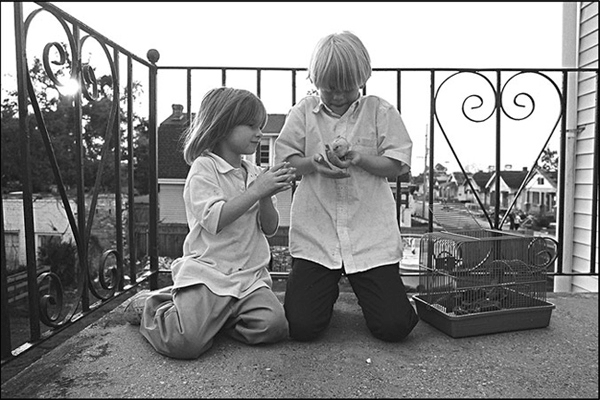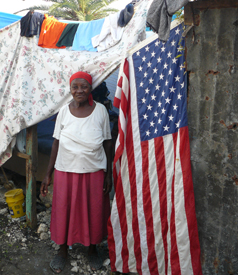
On September 6, 1955, a little over a week after he was kidnapped, beaten, and murdered for whistling at a white woman, Emmett Till was laid to rest at Burr Oak Cemetery in Alsip, Illinois. By the time his journey to the grave had ended, Till's body had been seen by as many as 50,000 people who personally came to view his body at a Chicago funeral home. But before long, it would be seen by millions more, as photographs of his badly disfigured corpse circulated around the country, ultimately appearing on the cover of Jet magazine. The image of a 14-year-old boy with his eye gouged out and his head caved in was a shock to the senses of all who saw it; but it was also a rallying point for a generation of young African-Americans, and many whites as well, who saw in his mutilated face the suffering of a people, and who were inspired to end that suffering by organizing, by marching, and by voting.
The face of Emmett Till might not have inspired so many if it were not for the grim determination of his mother, Mamie Till Bradley. The funeral home where Till's body was displayed resisted allowing the casket to be opened, but Mrs. Bradley insisted, threatening to open the casket herself if need be. She wanted to see her son one last time before he left this world, but she wanted others to see him too. And so, because of her perseverance, the casket of Emmett Till was opened, his body was photographed for posterity, and the world saw what they did to Mrs. Bradley's baby.
For African-Americans in the South, the horrors reflected in the face of Emmett Till were a daily fact of life. But for African-Americans who had moved away from the South and its Jim Crow laws to places like Chicago, the face of Emmett Till was a reminder that the brutality of racism could not be left behind so easily.
Two months ago, I had a nice apartment in Chicago. I had a good job. I had a son. When something happened to the Negroes in the South I said, 'That's their business, not mine.' Now I know how wrong I was. The murder of my son has shown me that what happens to any of us, anywhere in the world, had better be the business of us all.
-- Mamie Till Bradley
As for white Americans, they were forced to take a serious look at the human toll of the injustice that they had participated in, or tolerated, or tried to ignore. Though many whites, particularly in the South, were unmoved by what they saw (or at least pretended to be), many more were deeply affected by it:
You know, I remember in interviewing people in the course of doing [Eyes on the Prize] that it was not only young black people who spoke about Till, but young white people as well, who had the idea that this is someone our age, you know, a pre-teen really, or young teen, and if you can see that happening to a young black child down in Mississippi, it's not only black kids who say, "Well, it's not that I can't be the teacher or nurse, but if they kill people, this is serious," and that young white people also said, "If they're killing people, it's not just a matter of some folks don't like colored people, this is horrible, and this can't be allowed to go on. I've got to do something about this."
-- Juan Williams
Despite the publicity and anger generated by the photographs of Emmett Till, the people who murdered him were never brought to justice. A little over two weeks after Till was laid to rest, an all-white, all-male jury acquitted the only two men ever formally charged with his murder: Roy Bryant, the husband of the woman who Till whistled at, and Bryant's half-brother, J.W. Milam. Both men would later admit to murdering Till, safe from prosecution due to double jeopardy protection. They're dead now, and while as many as 12 other people may have participated in the crime, no one else has been charged in connection with Till's murder.
But though Emmett Till and his family never received justice from the state of Mississippi, the wave of activism spawned by those who were inspired by the sight of his mutilated body brought justice of a different sort. The face of Emmett Till would inspire Rosa Parks not to give up her seat on a public bus in Montgomery, Alabama later that year. It would inspire nine African-American schoolchildren to desegregate Little Rock Central High School in 1957. It would inspire sit-ins in Greensboro in 1960, and Freedom Riders in 1961. It would inspire voter registration drives, and a letter from a Birmingham jail cell. It would inspire over 300,000 people to march on Washington, and millions to dream of a day when people would "not be judged by the color of their skin, but by the content of their character." It would inspire the Freedom Summer of 1964, and the Voting Rights Act of 1965. And more than 50 years after the death of Emmett Till, in a country where racism still endures but without the power that it once had, it would inspire millions of voters, black and white, to reject the prejudices and fears of the past, and elect the son of a white woman from Kansas and a black man from Kenya to be the 44th President of the United States.
Today, as we consider the decision of that same President to block the release of hundreds of photographs showing the torture and abuse of detainees in Afghanistan and Iraq, I hope that those of us who are defending his decision will consider the example of Emmett Till, and of how seeing with open eyes the horrors that he endured brought about change in the hearts and minds of so many. Bush, Cheney, and their subordinates may have given the order to torture detainees, but it was the apathy, fear, and ignorance of millions of Americans that laid the groundwork for these abuses to take place. We as a nation need to be confronted with our failures and to take ownership of them, so we can set a positive example for young Americans to prevent such abuses from happening in the future. And we need to show those outside America that we can and will live up to our democratic values, so that we'll be taken seriously when we attempt to share those values with the rest of the world. This isn't about the next election--it's about the next generation, and about what kind of America they will build on the ashes of what we allowed to be ruined.
**********************************************
UPDATE: Wow, I'm really overwhelmed by the response that this diary has generated! I posted this really late last night (I'm a hopeless insomniac), and when I turned my computer off the diary still hadn't generated any response and I figured that it would disappear into obscurity like the handful of other diaries I've posted. So you can imagine my utter shock when I pulled up the web site, only to see my diary on the rec list with hundreds of comments. Needless to say, my first response was to run from the computer, and hide under my bed...
Usually, my diaries only get a few comments, and I like to respond to as many of them as possible. In this case, unfortunately, I doubt that's going to be an option. However, I have perused the comments and saw a lot of really good dialogue both supportive and critical. I'm planning on posting a follow-up diary tonight to respond to your comments generally, since the idea of responding to them individually seems a bit intimidating due to the sheer volume. I hope that doesn't seem like a dodge to those of you who have been critical of my diary, because I think there has been some valid criticisms raised and they deserve a response.
In the interim, in response to suggestions made by some of you below, I've decided to add a picture of Emmett Till that was taken before his death, to show what his face looked like before it was disfigured by his murderers. In retrospect, I regret not anticipating the possibility that the photo of Till in his coffin dehumanized him to a certain extent, and not foreseeing the need to give us all a glimpse of the young man that Emmett Till was before he was so brutally killed.
Thank you all for taking the time to read and respond.




























name: Carol D Lee
e-mail: cdlee@northwestern.edu
title: Professor
department: Education & Social Policy
preferred address: ANNENBERG 2120 Campus Drive
331
EV 2610
telephone number: +1 847 467 1807
Just checked the public records on the Shabazz School. I wonder if they would pay the teachers at their school to only teach one class.
Some of the salaries are fairly heatlthy:
http://www.guidestar.org/FinDocuments/2008/364/229/2008-364229273-04c45bc6-9.pdf
Forget the numbers. Get back to the basic question: Is it wise for CSU to be paying Madhubuti $100,000+ a year to teach ONE class?
Of course not. And they finally realized that, and asked him to take on a larger work load... which "insulted" him somehow, and he decided to tell the world that he was "forced" to retire.
What is this mans degree in ?
What department does he teach in ?
What classes does he teach ?
Can't he easily get another position at another college / university ?
Was he tenured at this college ?
However if you take the statistics that you have, and make the institutions with great stats break out their measurements on their first time full time black freshmen, they do worse than CSU.
Context matters.
I fully realize that everything you read is not necessarily true, but my numbers come from many sources, not just one. You may not like them, but the numbers are real. Unless you think that all of the various sources are all lying?
If you don't believe me, do your own research. Go to google, type in "Chicago State University graduation rate," and click on the links that you see. Feel free to look around and see for yourself.
I still say that you are wrong about the numbers and what they mean. Everything you read is not true.